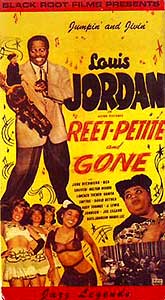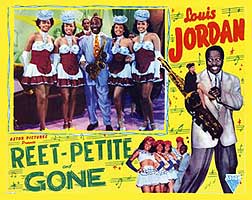 Reet, Petite, & Gone (1947) stars jump-jazz giant Louis Jordan, playing two roles, as Louis Jarvis the band leader, & as Schyler Jarvis (pronounced Skylar) his own father in flashbacks to his dad's youth.
Reet, Petite, & Gone (1947) stars jump-jazz giant Louis Jordan, playing two roles, as Louis Jarvis the band leader, & as Schyler Jarvis (pronounced Skylar) his own father in flashbacks to his dad's youth.
The real purpose of the film is to present the music of Louis Jordan & His Tympany Five, plus a couple other singers. Often films of this type have such marginal stories that they might as well have had none. But this one almost develops into screwball comedy romance in its own right.
It starts out, however, right from the first scene, as "just the music." The band is on the air at a radio station & their first number is "The Texas & Pacific," written by Jack Wolf Fine. It's a travelin' song as well as a train song, about a journey to west Texas, & it's first rate.
They go right into the second number, the totally charming "All for the Love of Lil." Louis starts off on his alto sax. Then he begins the lyrics:
"Got some money in my jeans/ Feeling like a man of means/ I'll give up all those other queens/ All for the love of Lil. No more nights at Sloppy Joe's/ No more bettin' on the nose/ I give up all my fancy clothes/ All for the love of Lil." In 1948 this song reached number thirteen on the R&B charts.
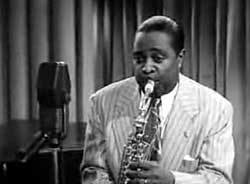 The show is interrupted & Louis is informed his father's dying. This sad news leads to flashbacks with Schyler Jarvis about thirty years earlier. Schyler meets & falls in love with Lovey Linn (Bea Griffith). The show is interrupted & Louis is informed his father's dying. This sad news leads to flashbacks with Schyler Jarvis about thirty years earlier. Schyler meets & falls in love with Lovey Linn (Bea Griffith).
They should've gotten married & lived happily ever after, but Lovey's mother conspires to get her married off to a man of means rather than an entertainer.
During the flashback we get the song "Tonight, Be Tender to Me." It's not a very Louis Jordanish tune, but more a pure swing number. Schylar performs it in a duet with Lovey:
"Tonight, be tender to me/ For tomorrow is tonight's memory/ Tonight, be tender to me/ In your arms let me find ecstacy." Although it's a sweet song, without Louis' orchestra & jazz approach it's just too conservative.
The song is by Gloria Parker & Barney Young. Gloria was a prolific songwriter who rarely got credited, selling her songs outright & never seeing royalties. Gloria probably also wrote "You Got Me Where You Want Me" & "I've Changed Completely" for this film.
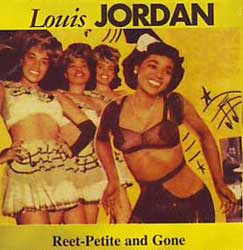 Back in Louis Jarvis's "present," his father lies dying ("old" Schyler is played by J. Louis Johnson who played porters, pullmen, & butlers in the 1940s & 1950s). Back in Louis Jarvis's "present," his father lies dying ("old" Schyler is played by J. Louis Johnson who played porters, pullmen, & butlers in the 1940s & 1950s).
Schyler carried a torch his whole life for Lovey Linn. Waiting rather long to get round to making a will, he's finally creating an odd one that requires his son Louis to get married to Lovey's daughter Honey Carter (also played by Bea Griffith).
Although Louis has never met this young woman, Schyler just sort of instinctively knows they'll be right for each other, just as Schyler & Lovey would've been right if others hadn't interferred.
Schyler died before his son could get home for a final farewell. Alas, Schyler had a crooked attorney (Lorenzo Tucker), who trumps up quite a different will that seems to demand that Louis marry Rusty (Vanita Smyth), the attorney's secretary/girlfriend. Schylar had been worth a small fortune, & the attorney with Rusty's help plans to get control of that money.
Louis has been preparing a new show & could use a little extra money to launch it properly, but nothing on earth will make him marry Rusty, a pretty enough girl but too obviously a scoundrelly young thang.
Meanwhile Honey Carter is in town with her best friend June (June Richmond), with hardly a dime to their names, intent on finding work as singers. Enough to say that when Louis meets Honey, it's love at first sight for both of them, & the romance that develops is a good little story.
Thank's to Schyler's butler Dolph (David Bethea), who was entrusted with another copy of the actual will, it'll all end well for everyone except for Rusty & the crooked attorney, who'll be hauled off to jail before all's said & done.
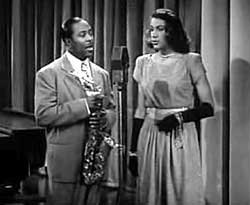 We get quite a lot of songs en route to this story working itself out. Back in the soundbooth for the radio show, we were introduced to a friend of Louis Jarvis, Pat Rains, played by Pat Rainey (also known as Pat Rau).
We get quite a lot of songs en route to this story working itself out. Back in the soundbooth for the radio show, we were introduced to a friend of Louis Jarvis, Pat Rains, played by Pat Rainey (also known as Pat Rau).
Though not seen in many films, Rainey was a great beauty & a singer for the Nobel Sissle Orchestra & the Tommy Stewart Orchestra.
Rainey never became all that well known outside of Harlem, yet her performance singing "The Blues Ain't Nothin'" indicates those who did see her live couldn't've been disappointed.
It's a slow-dance number & Louis's small band duplicates a big-band swing sound. Louis & Pat talk about getting the blues & then she starts singing: "The blues ain't nothin', ain't nothing at all, but a poor girl who's feeling sad." This mellow tragic piece was written & originally performed by blues gal Ida Cox.
Next on the menu is Louis singing "The Green Grass Grows All Around," written by William Jerome. With Louis's special arrangement, it begins with nonsense phrasing.
Still in the radio program booth he's scatting: "Boo-boo boodlee-ak boolie/ Boo-boo boodlee-ak boolie/ Boop Boop boop-boop/ Boop Boop boop-boop/ Boodle-oodle-oodle-oodle-oop." But then it goes into what could well be regarded a cute little call & response jazz number for preschoolers:
"There once was hole (There once was a hole)/ I said there was a hole (I said there was a hole)/ The prettiest little hole (The prettiest little hole)/ That you ever did see (That you ever did see)/ Now there once was a hole in the ground/ & the green grass grows all around all around & the green grass grows all around."
The lyrics build like "Found a Peanut" or "Hole in the Bottom of the Sea," with the feathers on the bird from the egg on the limb on the tree on the roots in the dirt in the hole in the ground. The sweetness of the piece is a delight but it's also a genuine toe-tapper.
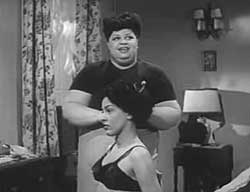 Honey & June are in their new apartment making plans for how to get work in the city. June has learned about an audition for a new show that'll be headlined by Louis Jarvis.
Honey & June are in their new apartment making plans for how to get work in the city. June has learned about an audition for a new show that'll be headlined by Louis Jarvis.
Bea Griffith as Honey is a beautiful slim woman who gets half undressed for this scene, but June Richmond is a big, big, big woman, one with an amazingly fine voice, in this number reminiscent of Judy Garland.
The whole sequence of June & Honey alone in the apartment seems to be designed to provide a little cinematic cheesecake via Griffith while letting Richmond belt out a song.
But when June starts singing a love song while combing half-undressed Honey's hair, it has the unavoidable effect of Honey & June being butch-femme lovers. Not something the story intended, but watch that intimate scene for yourself.
June sings "I've Changed Completely" while brushing Honey's hair: "I told myself long ago that I'd never open my heart/ But since I met you, I've changed completely."
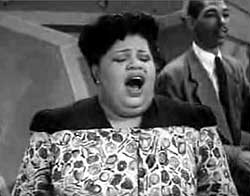 Later on June, backed up by Louis & the band, sings "You Got Me Where You Want Me," which shows off her great voice: "I always thought I'd know/ Where to stop or go/ When it came to loving." Later on June, backed up by Louis & the band, sings "You Got Me Where You Want Me," which shows off her great voice: "I always thought I'd know/ Where to stop or go/ When it came to loving."
It's swing rather than jump jive, & for a conservative number it's pretty good. But Louis stops her singing halfway through & giving June a hard time demands "Can't you do something else?"
He makes like he doesn't believe she can sing, though in fact he's quick to sign her into his planned show.
June Richmond, a black Sophie Tucker type, had been one of the first black women to travel & perform with a white band when she was with Jimmy Dorsey's Orchestra in 1938.
Eventually she became a solo act. Racism, & no doubt "fattism," drove her to Europe a scant year after making Reet Petite & Gone with Jordan. In Europe her career flourished until her unexpected early death in 1962 from heart disease.
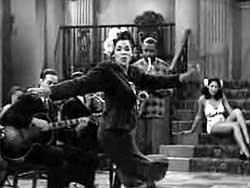 Louis has arranged for some auditions at the Jarvis home. In the living room setting, looking more like a private party than official audition, Louis & the boys are performing a number Louis wrote:
Louis has arranged for some auditions at the Jarvis home. In the living room setting, looking more like a private party than official audition, Louis & the boys are performing a number Louis wrote:
"Wham Sam! Dig them gams!/ Mellow like corn & country ham" while coming on to the cuties showing their gams.
Seated on the davenport the room is a gal with very wham bam gams, & that's Mabel Lee, "the hoofin' diva." She proved to have quite the longevity in the dance community & in 2005 became a Flo-Bert Honoree for Lifetime Achievement in Tap Artistry, & was the 2001 recipient of the New York Tap Committee's Positive Role Model Award.
At the height of her career she danced out in front of orchestras with Cab Calloway, Eubie Blake, Noble Sissle, among others. The film's director William Forest Crouch included Mabel in a handful of the jukebox soundies he directed (Crouch also excerpted many if not all the songs from Reet, Petite & Gone as three-minute soundies for video jukebox play).
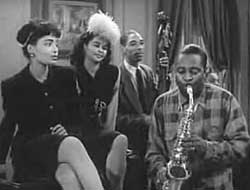 Mabel was a singer, too, but dance was her greater calling. Here she jumps up & does a sweet boogie dance when Louis reaches his sax solo. The International Movie Data Base incorrectly credited her with singing the song actually sung by Pat Rainey in an earlier scene. Mabel was a singer, too, but dance was her greater calling. Here she jumps up & does a sweet boogie dance when Louis reaches his sax solo. The International Movie Data Base incorrectly credited her with singing the song actually sung by Pat Rainey in an earlier scene.
Also during this living-room sequence, Louis & his guys perform "I Know What You're Puttin' Down" while Louis pretends the girl sitting at the piano is his girlfriend, though in the story, she ain't.
That beauty isn't credited though just sitting on the piano she steals the scene; she's the most beautiful woman in a film with a lot of beauties in it. She's got to be be (like Mabel Lee) one of "Harlem's Apollo girls,"
Louis sings to her: "There's a whole lotta talk around town/ About how you're carrying yourself/ You're jivin' everybody in town/ But baby, I know what you're puttin' down." This was a moderate hit for Louis & reached number 33 on the R&B charts in 1947.
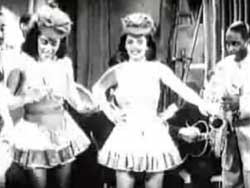 The Tympany Five & Louis will next be placed in a cluttered environment for a backstage rehearsal. Louis is wailing on his sax then begins to sing "Let the Good Times Roll": The Tympany Five & Louis will next be placed in a cluttered environment for a backstage rehearsal. Louis is wailing on his sax then begins to sing "Let the Good Times Roll":
"Hey everybody, let's have some fun/ You only live but once & when you're dead you're done/ So let the good times roll/ Let the good times roll/ Don't care if you're young or old/ Get together & let the good times roll." In 1946, this song went to #2 on the R&B charts.
It was written by Sam Theard & Fleecie Moore, & is one of those pre-rock 'n' role rock numbers that were pointing toward that new direction in music. Sam had previously written "I'll Be Glad When You're Dead You Rascal You" which was a big hit for Louis Armstrong & for the Mills Brothers. Fleecie also wrote one of Louis Jordan's big hits, "Caldonia," & co-wrote with Claude Demetrius another of this film's numbers, "Ain't That Just Like A Woman?"
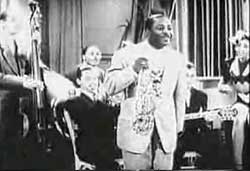 The misogynist lyrics of "Just Like" are almost certainly the doing of Claude, who had a knack for turning anger at women into classics, as he wrote "Heard Headed Woman" recorded by Elvis Presley, & "Mean Woman Blues" recorded by both Elvis & Roy Orbison. The misogynist lyrics of "Just Like" are almost certainly the doing of Claude, who had a knack for turning anger at women into classics, as he wrote "Heard Headed Woman" recorded by Elvis Presley, & "Mean Woman Blues" recorded by both Elvis & Roy Orbison.
A chorus girl is sitting on a box while Louis sings "Let the Good Times Roll." And before the song's over, some other girls will have wandered in to listen in. The girls get more active on the second back-stage number, a boogie piece that goes:
"I found a gal who beats them all/ She isn't too short & she isn't too tall/ She's in the groove & right on the ball/ Because she's reet, petite, & gone." It's the film's title song, & "Reet" was jive talk for "all right," or all reet. In theme, it is the opposite of Louis's "women stink" song that'll come up a couple songs later, "Ain't That Just Like a Woman."
It's at this point during the backstage performances that June Richmond turns up to sing "You've Got Me Where You Want Me," & then the film moves on to the completion of the story of the crooked attorney's phonied up will, the romance of Louis & Honey, & all other plot elements get tied up just before we reach opening night for Louis's great new show.
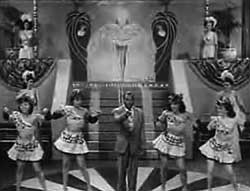 The final long segment are the songs performed on stage on opening night for Louis's new show, called Swing Out Loud. The first number is "That Chick's Too Young to Fry," an obvious sexual innuendo. It reached #3 on the R&B charts the year before the film's release:
The final long segment are the songs performed on stage on opening night for Louis's new show, called Swing Out Loud. The first number is "That Chick's Too Young to Fry," an obvious sexual innuendo. It reached #3 on the R&B charts the year before the film's release:
On the ornate Egyptian motif stage, flanked by chorus girls, Jordan sings: "Hey boy. Don't you harm that bird/ Don't you dare to try/ Start releasin' that chicken or you'll get a lickin'/ That chick's too young to fry."
Next up is "Aint That Just Like a Woman." Standing beside an uppity woman, Louis sings her the jumpin' jivin' insultin' boogy tune:
"Adam was happy as a man could be/ Until Eve started messin' with that apple tree/ Ain't that just like a woman. Ain't that just like a woman/ Ain't that just like a woman they'll do it every time."
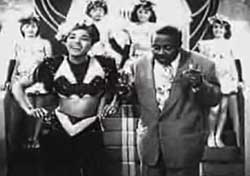 As the verses procede, we get other examples of how women suck: Lot's wife sucked for Lot, Delilah sucked for Samson, Marie Antoinette sucked for eating cake. As the verses procede, we get other examples of how women suck: Lot's wife sucked for Lot, Delilah sucked for Samson, Marie Antoinette sucked for eating cake.
But weirdest is the verse that assumes Nero, fiddling while Rome burned, was just like a woman. It really sounds like the lyricist thought Nero was a woman. It was already the film's worst song even before the lyric just got uneddikated.
The gal Louis keeps insulting does a great dance at the instrumental, while women stand decoratively in the background. The set looks so fancy but must've been a bit fragile or the gals on the steps would've been dancing.
The sound of the number, though not the words, is pretty cool, & the dancer totally eradicates Louis' pretence of a low opinion of her.
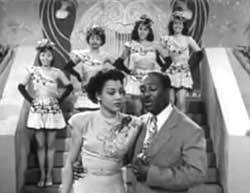 The last song of the film is "If It's Love You Want, Baby, That's Me." Louis performs it alongside Bea Griffith, who alas is only for decoration this time, as she never does get to sing a second song after the flashback when she plays her singer mom. The last song of the film is "If It's Love You Want, Baby, That's Me." Louis performs it alongside Bea Griffith, who alas is only for decoration this time, as she never does get to sing a second song after the flashback when she plays her singer mom.
"If It's Love You Want, Baby, That's Me" was written by Sid Robbin, better known for cowboy swing compositions. It's a smooth jazz piece with sweet lyrics:
"Take your time & think it over/ Don't do anything that's rash/ Don't go for a guy with flash/ Cuz love will last longer than cash./ If you want a guy with class/ Who's way beyond the mass/ I'm not the right type, I must agree./ But if you feel like getting sent/ From a truly righteous gent/ If it's love you want, baby, that's me."
In all this is quite a pleasurable film. It was a foregone conclusion that the music would be great, but it's nice to see Louis was a pretty reasonable actor as well, & I enjoyed the story.
copyright © by Paghat the Ratgirl
|
